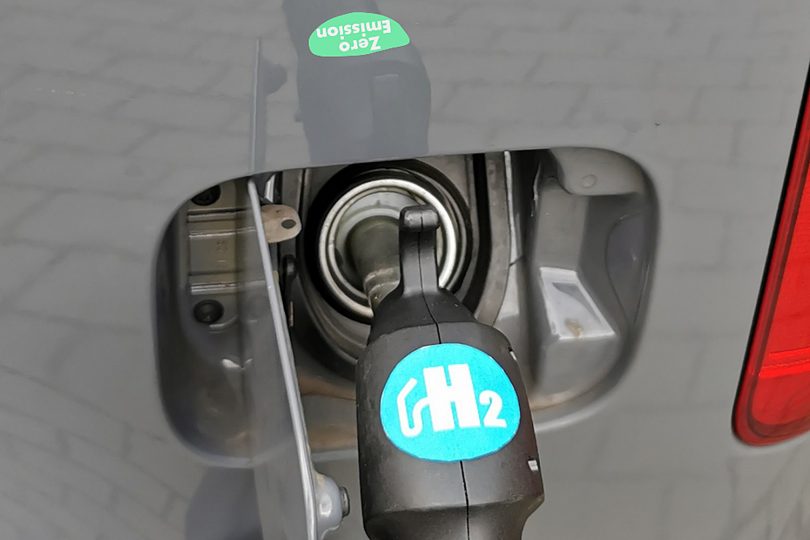Minister Julia Willie Hamburg visited the NFF Deputy Prime Minister learned about mobility research
Alternative propulsion technologies, digitalisation in connection with the logistics sector or even autonomous driving are some of the developments that bring new challenges in mobility. More than 1,000 scientists are researching the future of mobility at the Automotive Research Centre Niedersachsen (NFF), a centre at Technische Universität Braunschweig. Deputy Minister President of Lower Saxony and Minister of Education Julia Willie Hamburg was able to see this for herself during her summer trip.
The NFF not only deals with all issues of ground-based mobility in research and teaching, but also increasingly in the field of further education and qualification. To this end, the NFF research vision on sustainable mobility was expanded to include the cross-sectional research field “Transformation von Mobilität – Arbeit, Recht, Geschäftsmodelle” (Transformation of Mobility – Work, Law, Business Models). From the sub-field “Work”, Professor Simone Kauffeld provided information on the continuing education network “(Re)Shape Automotive Industry: Upskilling and Reskilling”. Together with vocational training stakeholders, companies and academic experts, concepts are to be developed at the NFF to qualify employees for the new challenges of the world of work. These changes in the automotive industry result from digitalisation, electrification and their effects, e.g. on business models.
With the increasing digitalisation in the mobility sector, the legal issues are also changing. From delivery robots to adaptive micromobiles to autonomous public transport, various legal areas are gaining relevance. Professor Anne Paschke, Director of the Forschungsstelle Mobilitätsrecht at TU Braunschweig, gave an insight into the current legal policy considerations with regard to automated and connected driving.
Building on changing mobility and logistics needs, researchers at the NFF are also looking at how the interaction of people, goods, means of transport and infrastructure can be optimised. Application-oriented concepts, solutions and business models are being developed, for example, in the “Zukunftslabor Mobilität” (Future Lab Mobility), as NFF Board Spokesman Professor Thomas Vietor, Head of the Institute for Engineering Design at TU Braunschweig, and NFF Board Member Professor David M. Woisetschläger, Head of the Chair of Services Management at TU Braunschweig, explained to the delegation. To this end, the four disciplines – vehicle technology, transport research, computer science and business administration – are being brought together.
From the fuel of the future to the driverless future
The minister was able to see for herself the concrete results of this research work during a tour of the NFF Technical Centre. For example, the NFF is working in a leading role with the Institute of Automotive Engineering at TU Braunschweig and other partners on commissioning a genuine driverless passenger shuttle in flowing traffic and at high intervals or according to individual customer requirements at the mobility cluster research airport by mid-2024. The prototypical Level 4 vehicle concept RAION based on an intelligent and electrified driving platform also incorporates results from projects within the framework of the future lab (e.g. AutoMoVe).
In this and in the implementation of further research projects, the centre benefits from the good networking with university and non-university institutions and industrial partners in Lower Saxony and beyond. For example, the innovation laboratory “THEWA – Thermomanagement von Wasserstoff-Tankstellensystemen” (Thermal Management of Hydrogen Filling Station Systems) or the construction of an H2 terminal in the immediate vicinity of the NFF building at the Braunschweig Research Airport bundle research expertise along the hydrogen efficiency chain and realise research work around the topics of hydrogen production, storage, feed-in and distribution as well as reconversion in fuel cells. The aim is to make hydrogen-based fuel cell technology applicable for various mobility applications such as cars, aircraft, trains and ships.
About the NFF
The NFF focuses on future-oriented topics in vehicle and traffic engineering research. It was founded in 2007 with the support of the government of Lower Saxony and Volkswagen AG in order to establish the Braunschweig research region as a top location for vehicle technology with international standing. The central vision is sustainable mobility, which is implemented in five research fields:
- Automated and connected driving
- Emission-free vehicle and drive systems
- Digitalisation and artificial intelligence
- Flexible vehicle concepts and vehicle production
- Transformation of mobility, work and business models
The NFF currently has 48 members, who are not only made up of institutes from the universities of Braunschweig, Hannover and Clausthal, but also from other research institutions in the region (including Fraunhofer, Ostfalia).

